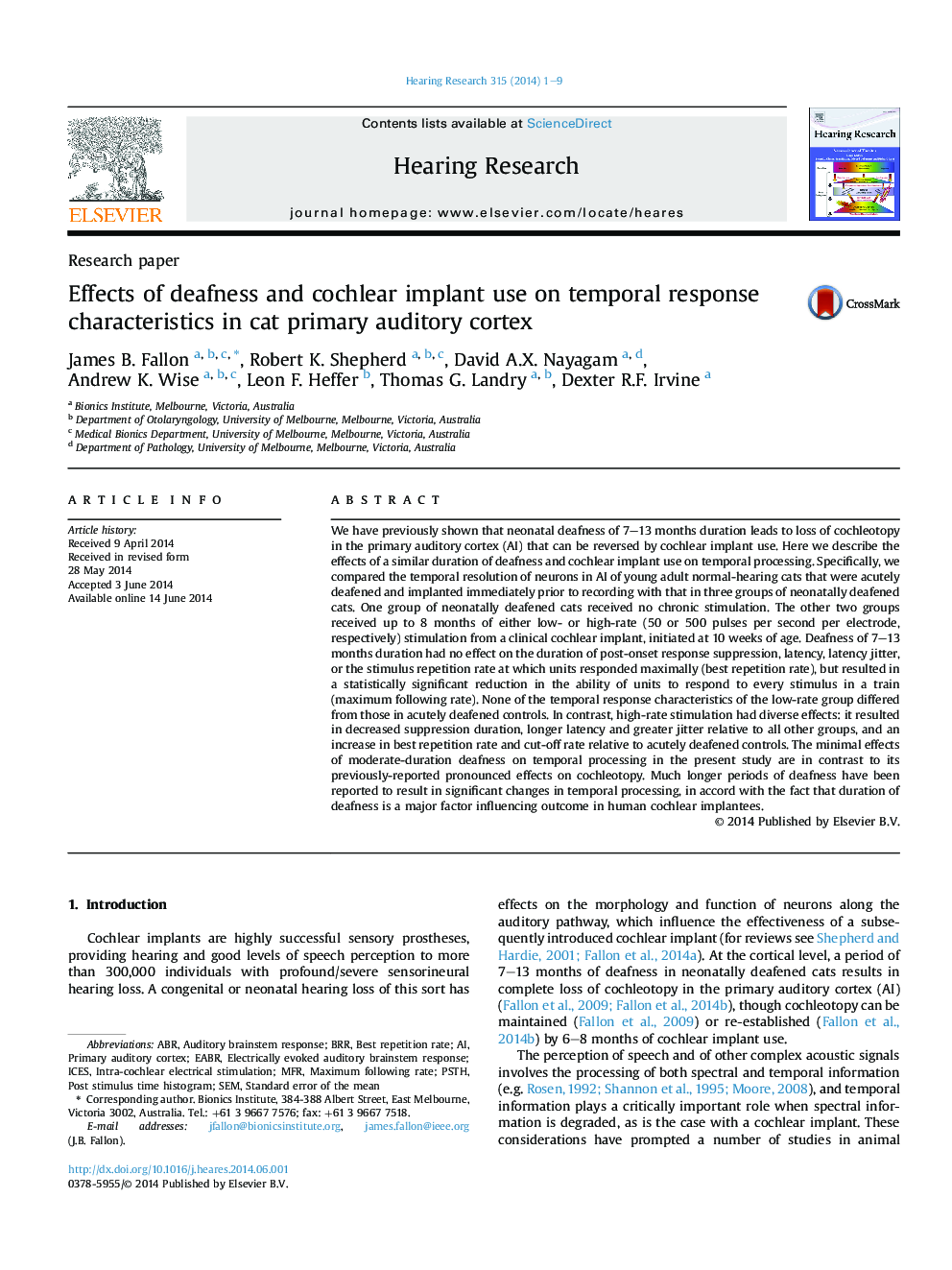| کد مقاله | کد نشریه | سال انتشار | مقاله انگلیسی | نسخه تمام متن |
|---|---|---|---|---|
| 6287357 | 1615585 | 2014 | 9 صفحه PDF | دانلود رایگان |
عنوان انگلیسی مقاله ISI
Effects of deafness and cochlear implant use on temporal response characteristics in cat primary auditory cortex
ترجمه فارسی عنوان
اثرات ناشنوایی و استفاده از ایمپلنت کچلور بر خصوصیات پاسخ زمانی در قشر شنوایی اولیه گربه
دانلود مقاله + سفارش ترجمه
دانلود مقاله ISI انگلیسی
رایگان برای ایرانیان
کلمات کلیدی
ABRICESPSTHMFRBRReABR - EABRstandard error of the mean - خطای استاندارد میانگینprimary auditory cortex - قشر شنوایی اولیهSEM - مدل معادلات ساختاری / میکروسکوپ الکترونی روبشیElectrically evoked auditory brainstem response - واکنش مغزی شنوایی شنوایی الکتریکیauditory brainstem response - پاسخ شنوایی مغز
موضوعات مرتبط
علوم زیستی و بیوفناوری
علم عصب شناسی
سیستم های حسی
چکیده انگلیسی
We have previously shown that neonatal deafness of 7-13 months duration leads to loss of cochleotopy in the primary auditory cortex (AI) that can be reversed by cochlear implant use. Here we describe the effects of a similar duration of deafness and cochlear implant use on temporal processing. Specifically, we compared the temporal resolution of neurons in AI of young adult normal-hearing cats that were acutely deafened and implanted immediately prior to recording with that in three groups of neonatally deafened cats. One group of neonatally deafened cats received no chronic stimulation. The other two groups received up to 8 months of either low- or high-rate (50 or 500 pulses per second per electrode, respectively) stimulation from a clinical cochlear implant, initiated at 10 weeks of age. Deafness of 7-13 months duration had no effect on the duration of post-onset response suppression, latency, latency jitter, or the stimulus repetition rate at which units responded maximally (best repetition rate), but resulted in a statistically significant reduction in the ability of units to respond to every stimulus in a train (maximum following rate). None of the temporal response characteristics of the low-rate group differed from those in acutely deafened controls. In contrast, high-rate stimulation had diverse effects: it resulted in decreased suppression duration, longer latency and greater jitter relative to all other groups, and an increase in best repetition rate and cut-off rate relative to acutely deafened controls. The minimal effects of moderate-duration deafness on temporal processing in the present study are in contrast to its previously-reported pronounced effects on cochleotopy. Much longer periods of deafness have been reported to result in significant changes in temporal processing, in accord with the fact that duration of deafness is a major factor influencing outcome in human cochlear implantees.
ناشر
Database: Elsevier - ScienceDirect (ساینس دایرکت)
Journal: Hearing Research - Volume 315, September 2014, Pages 1-9
Journal: Hearing Research - Volume 315, September 2014, Pages 1-9
نویسندگان
James B. Fallon, Robert K. Shepherd, David A.X. Nayagam, Andrew K. Wise, Leon F. Heffer, Thomas G. Landry, Dexter R.F. Irvine,
